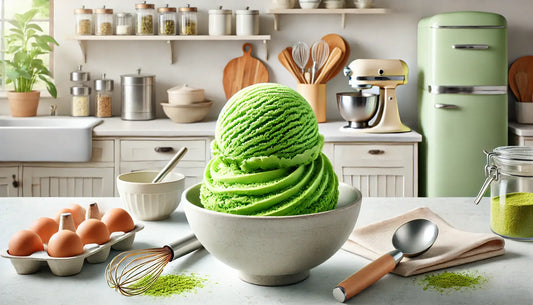Does green tea help in digestion? 🍵
With so many green tea benefits digestion seems like it would be one of them. In this article, we are going to cover all things green tea and digestion.
We’ll see is green tea good for digestion and even help you find the best green tea for digestion.
Let’s get started! 👇
Does Green Tea Help in Digestion

So right off the bat, does green tea help in digestion?
Yes, there are a number of different reasons to drink green tea for digestion.
It’s important to note that these benefits will be reduced if other ingredients are added to the green tea, like milk or sugar.
If you want to get the most out of your green tea, we recommend you go for a quality tea that tastes good without any sweetener.
This is how you will be able to benefit from green tea digestion.
By the way, you might occaisionally feel nauseous from drinking green tea, so is green tea good for digestion even though it can sometimes have this effect?
To learn more about that, you'll want to read this article 👉 Tea Troubles: Why Does Tea Make Me Nauseous?
Why Does Green Tea Help with Digestion
So now that we’ve answered the question is green tea good for digestion, let’s talk about why does green tea help with digestion. We’ll cover the unique attributes of green tea and how they can benefit digestion.
Antioxidants
One of the green tea digestion benefits has to do with antioxidants. Green tea is rich in antioxidants, particularly catechins such as epigallocatechin gallate (EGCG). These antioxidants are thought to protect the body against free radical damage and help with everything from aging to weight loss.
These antioxidants may also help reduce inflammation and protect the cells lining the digestive tract, promoting overall digestive health. Green tea digestion benefits are just the beginning, if you want to learn about the other things antioxidants can do, you should read this article 👉 Green Tea Benefits and Why You Should Drink it Everyday
Polyphenols
In addition to the antioxidants, another benefit of green tea for digestion is the polyphenols. These are compounds that may have positive effects on the gut microbiota. A balanced and diverse gut microbiota is essential for efficient digestion and nutrient absorption.
The polyphenols in green tea, by promoting a balanced and diverse gut microbiota, contribute to a healthier digestive system, aiding in the breakdown of food and enhancing the absorption of essential nutrients for overall well-being
Caffeine Content
So why does green tea help with digestion other than the antioxidants? One of the answers could be the moderate caffeine content.
While excessive caffeine intake can have adverse effects on digestion, the moderate amount of caffeine in green tea may stimulate gastric acid production, aiding in the digestion of food. However, people with sensitive stomachs should be mindful of their caffeine intake. So does green tea help digestion despite its caffeine content? As long as it is in moderation it would seem so.
By the way, if you are looking for low caffeine green teas, this is the perfect article for you 👉 8 Lowest Caffeine Tea: from Lowest to Highest
L-theanine
Another benefit of green tea and digestion has to do with the l-theanine. This is an amino acid that may have relaxing and calming effects. This can help reduce stress, which is known to impact digestion negatively. A relaxed state may promote more efficient digestion.
If you're interested in a tea that is high in theanine, you'll want to go for a gyokuro or long shaded green tea. To find out how this tea differs from a standard green tea, you'll want to read this article 👉 Gyokuro vs Sencha Health Benefits
Anti-inflammatory Effects
Some studies suggest that the anti-inflammatory properties of green tea may help soothe the digestive tract and alleviate symptoms associated with inflammatory conditions. This can also support a healthier gut environment, and contribute to more efficient digestion.
So does green tea help digestion? With all of these benefits, it would definitely seem like it does!
Which Green Tea Benefits Digestion the Most
So now that we’ve covered why does green tea help with digestion, we should be able to find a few teas that can help the most. Here are some you might want to try.
Bancha

When it comes to green tea and digestion, Bancha is really the star player.
This green tea is made from the older leaves of the tea plant, and it’s the second most popular green tea in Japan.
It’s common to drink this tea after a meal in order to soothe the stomach.
With lower caffeine levels and higher mineral levels, bancha is a gentle choice, particularly suitable for promoting digestion in the afternoon or evening.
Genmaicha
Genmaicha is a popular type of green tea made by combining toasted rice with green tea leaves.
This began as a way to make the tea harvest last longer, but people began to take notice of the delicious flavor.
Genmaicha offers a gentle, comforting brew that aids digestion.
Because it is usually made from the older leaves of the tea plant, it is also lower in caffeine and higher in minerals.
Hojicha
Hojicha is a type of roasted Japanese green tea, made by turning the tea leaves in a large hot pan.
This creates a warmer flavor, with notes of coffee, chocolate or caramel.
The roasting process also reduces caffeine, making hojicha a mild and stomach-friendly option.
Sencha

As we mentioned before, one of the reasons why is green tea good for digestion has to do with the antioxidants.
Sencha tea is rich in antioxidants, which can help support overall digestive health.
This is the most popular type of green tea in Japan, and it is made from leaves that have been steamed, rolled and dried.
It is normally unshaded, and when the tea plant is exposed to sunlight it converts more of it’s amino acids into catechins (antioxidants) as a protection against the UV rays.
Matcha
Matcha powder is made by grinding tea leaves into a fine powder. It's mixed directly into water, so you end up consuming the entire leaf. With concentrated antioxidants like catechins, matcha promotes digestive well-being. The one thing you will need to be careful of with matcha is the caffeine content.
We recommend using just 2 grams of ceremonial matcha, which will come out to about 68mg of caffeine. If you use much more than this, it may end up being a lot of caffeine.
Does green tea help in digestion? The Final Verdict

So does green tea help in digestion? It would appear so!
There are many green tea digestion benefits, and as long as you stick to the right ones and don’t add too much sweetener to them, you should find that they are able to help.
If you liked our list of which green tea benefits digestion the most, you can find all of the teas on our website.
We’ve traveled all around Japan meeting with tea farmers and sampling hundreds of different teas.
We’ve ultimately selected a small handful of our favorites and we’re happy to share them with all of you with free shipping worldwide.







